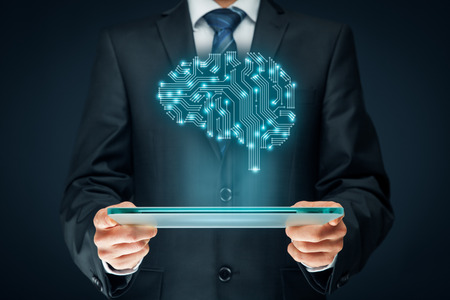 Twenty years ago, the technology boom was just beginning with the emergence of email and personal computers. In 2017, artificial intelligence — or AI as it is called — was all the rage and took the spotlight with it outgrowing the phase of all the experimentation and hype.
Twenty years ago, the technology boom was just beginning with the emergence of email and personal computers. In 2017, artificial intelligence — or AI as it is called — was all the rage and took the spotlight with it outgrowing the phase of all the experimentation and hype.
Today, artificial intelligence is changing the way lawyers think, the way they do business and the way they interact with clients. It is more than legal technology — it is the next great hope that will revolutionize the legal profession. Change can be brought on through pushing existing ideas. What makes artificial intelligence stand out is the potential for a paradigm shift in how legal work is done.
Now, according to Gartner, the industry is past the peak of inflated expectations and the next phase is all about substance and practicality. In 2018, companies will increasingly realize that, rather than being a vague cure for anything and everything, the value comes from its ability to solve practical, real-world business problems. In fact, AI will become less visible in many cases, as it is more tightly integrated into the applications that people use every single day. Without even realizing it, companies will find that AI enables them to be much more productive, and frees them to spend more time on strategic business initiatives rather than tedious tasks.
iManage’s artificial intelligence expert and VP of Strategy Peter Wallqvist recently sat down with IPWatchdog to discuss AI’s impact on law this year. Technology industry leaders and consumers will find it valuable to integrate disparate AI technologies, according to Wallqvist – as AI becomes less siloed, they will discover that when these different AI technologies are integrated, they can deliver more than the sum of their parts.
More AI technologies will no longer be called AI
Just as previous technologies like Google Translate, Alexa’s speech recognition and NetFlix’s recommendation engine are no longer perceived to be AI, newer technologies, such as document classification and information extraction, will become so integrated into our applications that they will no longer be perceived as AI either.
“As AI technologies continue to proliferate, we will see people speaking about AI in more specific and tangible ways,” he said. “This is a sign that technology is reaching practicality and maturity as it is increasingly used by a large general audience vs. niche ones.”
A crucial role in security programs
Organizations will see more integration of AI into security and information governance technologies to lower the risk of and damage from cyberattacks, per Wallqvist. When it comes to detection of breaches, AI will be increasingly utilized to automatically build rules to identify user patterns, so that deviations in behavior that indicate a breach or malicious behavior can be detected.
Employee morale and retention will increase
Traditional industries like professional services, including law firms, insurance firms, etc., who implement AI technologies will see a large increase in employee morale and retention. Instead of being bogged down with boring, routine tasks, employees will have the opportunity to focus on more engaging, fulfilling work. Wallqvist says that this will prompt more firms to adopt AI, in order to keep employees from leaving their firm for another that is utilizing AI to reduce the amount of low-value, tedious work done by their employees.
“AI can improve in-house counsel’s and other legal service employees’ morale and retention by automating tedious, boring tasks, allowing them to focus on more interesting and strategic activities,” he explained. “For example, rather than having lawyers secluded in a room for weeks or more, manually reviewing and extracting privileged information from thousands of documents and contracts, law firms and in-house counsel can now complete these tasks in a fraction of time (often hours) then they did previously, while securing more accurate results.”
Now, thanks to new AI-driven robots, in-house counsel or the lawyers at their law firms can quickly automate these tasks, allowing them to spend more time on activities that are more fulfilling. And, this can help reduce attorney burnout, increase job satisfaction and make it easier for the firm to retain employees.
“With AI-driven robots that can automatically organize, extract information from and summarize documents, legal professionals can cost-effectively automate simple cognitive tasks for thousands of documents such as extracting a specific type of clause from these contracts that would take a team of lawyers days, if not weeks, to complete manually,” said Wallqvist. “Legal professional roles will become less labor and time intensive and there will be a gradual shift to focusing more on interpreting the output from this analysis.”
In addition, AI will help legal professionals identify documents that are subject to compliance requirements, improving overall risk management for clients.
Why exactly does the legal industry need this?
According to Wallqvist, corporate legal departments (and the law firms they hire) are under increasing pressure to cut costs and demonstrate the value their offer to the company or clients. AI robots can help corporate legal departments and law firms become more efficient, and spend less time on basic cognitive tasks.
“Without even realizing it, the industry will find that AI makes them more productive, and frees them to spend more time on strategic business initiatives that help them reduce risk or uncover new business opportunities,” he explained. “By delivering significant improvements in productivity and efficiency, and evolving the role of tomorrow’s law professional to be more strategic, AI will play an important role in the digital transformation of the legal industry.”

![[IPWatchdog Logo]](https://ipwatchdog.com/wp-content/themes/IPWatchdog%20-%202023/assets/images/temp/logo-small@2x.png)

![[Advertisement]](https://ipwatchdog.com/wp-content/uploads/2024/04/Patent-Litigation-Masters-2024-sidebar-early-bird-ends-Apr-21-last-chance-700x500-1.jpg)

![[Advertisement]](https://ipwatchdog.com/wp-content/uploads/2021/12/WEBINAR-336-x-280-px.png)
![[Advertisement]](https://ipwatchdog.com/wp-content/uploads/2021/12/2021-Patent-Practice-on-Demand-recorded-Feb-2021-336-x-280.jpg)
![[Advertisement]](https://ipwatchdog.com/wp-content/uploads/2021/12/Ad-4-The-Invent-Patent-System™.png)







Join the Discussion
No comments yet.